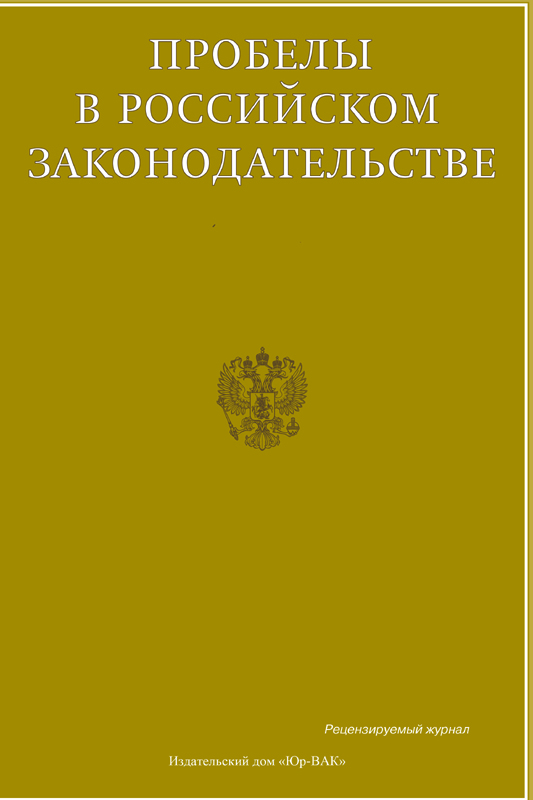Some Aspects of Countering Organized Crime in the Russian Federation
- Authors: Gutieva I.G.1
-
Affiliations:
- Krasnodar University of the Ministry of Internal Affairs of Russia
- Issue: Vol 16, No 4 (2023)
- Pages: 268-272
- Section: Criminal - legal, criminological, administrative and other measures for countering crime in contemporary conditions
- URL: https://journals.eco-vector.com/2072-3164/article/view/568481
- EDN: https://elibrary.ru/SRKHML
- ID: 568481
Cite item
Abstract
In the realities of modern times, organized crime has become widespread. Organized crime is a phenomenon that has many interrelated manifestations. As in all times, at present, the trends in the spread of the level consider it along with the problems of our time. Organized crime is a complex problem of modern society, which has a destructive impact on all sectors and spheres of society. Among the forms of organized crime, an organized group, a criminal organization and a criminal community are distinguished. These forms, in turn, are designed to commit certain types of crimes, including: organized terrorism and extremism, assassinations, corruption, illegal trafficking in nuclear materials, technologies, drugs, weapons, criminal gambling, trafficking in human beings and their organs. [1]. The legal basis for combating organized crime is Federal Law No. 46-FZ dated April 1, 2019 “On Amendments to the Criminal Code of the Russian Federation and the Code of Criminal Procedure of the Russian Federation with regard to combating organized crime”. The purpose of the scientific article is to get acquainted with the basic concepts, features, signs, forms and types, as well as consider some aspects of combating organized crime in the Russian Federation. In the work, the author considers such issues as the concept, signs, features and types of organized crime, and some aspects of combating organized crime in the Russian Federation. [2].
Keywords
Full Text
About the authors
Irina G. Gutieva
Krasnodar University of the Ministry of Internal Affairs of Russia
Author for correspondence.
Email: iragutieva@mail.ru
Police Colonel, Cand.Sci.(Law), Deputy Head of the Department of State and Civil Law Disciplines of the North Caucasus Institute for Advanced Studies (branch)
Russian Federation, Nalchik, KBRReferences
- On combating the legalization (laundering) of proceeds from crime and the financing of terrorism: Federal Law No. 115-FZ of August 7, 2001 (as amended on April 16, 2022) // Access from the ConsultantPlus legal system.
- On amendments to the Criminal Code of the Russian Federation and the Code of Criminal Procedure of the Russian Federation in terms of combating organized crime: Federal Law No. 46-FZ of April 1, 2019 (as amended on April 16, 2023) // Access from the reference legal system "Consultant Plus".
- Antonyan Yu.M. Criminology: textbook. M.: Yurayt, 2012. - Р. 383-384.
- Bogdanov A.V. Terrorism and extremism - a threat to modern civilization / A.V. Bogdanov, I.I. Ilyinsky, E.N. Khazov // Bulletin of economic security. - 2021. - No. 1. - P. 184-186.
- Bochkareva E.V. Organized crime as a form of self-determination of crime // Actual problems of Russian law 2019. No. 1. P. 156-162.
- Korsakov K.V. Criminological and criminal law analysis of modern organized crime // Antinomies. 2017. No. 3. Р. 67-84.
- On the National Security Strategy of the Russian Federation: Decree of the President of the Russian Federation of December 31, 2015 No. 683 // Access from the ConsultantPlus legal system.
- Obolensky Yu.B. Issues of combating organized crime // Uchechenyezapiski Crimean Federal University named after V.I. Vernadsky. Legal Sciences. 2021. No. 2. Р. 296-300.
- Pinkevich T.V. The current state of extremism and terrorism in the context of the development of digital technologies /T.V. Pinkevich, O.A. Zubalova // UP. - 2020.- No. 3 (94). Р. 62-65.
- Shakiryanov M.M. Counteracting organized crime: Russian and foreign experience // Bulletin of the Kazan Law Institute of the Ministry of Internal Affairs of Russia. 2018. No. 2. Р. 254-259.
Supplementary files









